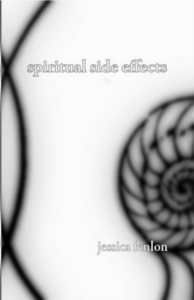Fall 2012
Table of Contents - Vol. VIII, No. 3
Poetry Fiction Translations Reviews
Barrett Warner
Jessica Fenlon,
Spiritual Side Effects, ISBN 978-0978296223, Gallery Six, 2010, 84 pages, $10.00.
“Pittsburgh Rare”
The line between being aware and feeling self-conscious is best sketched by an artist. Who better to wave the charcoal than Pittsburgh artist Jessica Fenlon? Her debut poetry collection Spiritual Side Effects has a stormy tone that gives the reader plenty to divine. These poems haven’t been smoked all the way through—they’re still bloody in their centers. In several, Fenlon eschews the perfectly knotted tie of an image in favor of a bigger reach, a panoramic vision. Fenlon doesn’t stand on a chair to change a lightbulb. She stands on a chair to change the whole night sky. In “The Yoga of Language” she writes—speaking to binary stars wheeling above her—“so we may be together in this moment/ draw close/ draw close/ to the negotiation/ of distant intimacy/ relative perspective’s a bitch, isn’t it.”
Fenlon’s sentences read with spare punctuation as if each poem were a collaboration of words and spaces. Her poems aren’t formal, but they have enough shape to keep us reading left to right. Some use line breaks to inform the reader when to breathe or blink. You could have a coffee and a ham sandwich during one of Fenlon’s pauses. I like this hurtling forward and full back stopping, like meditating out loud in spite of a stammer. Fenlon’s language rocks forward on edgy direct speech (“use liquor for a Molotov cocktail” and “pull the live ones back over the barbed wire”) which she modulates with a soothing, almost apologetic, plain-spoken narrative between charges: “I’ve been sweating gasoline lately,” and “If I flick up a flame on my index finger/ will I light your breath on fire?” This poem, “They Used to Call It Shell Shock,” puts the existential question in a very matter of fact tone. There’s no risk of the question becoming more important than its answer as so often happens with poet philosophers. And we’re not even all that surprised to find some painters wandering around the battle scene: “later over coffee in the 1930s.../ Max Ernst and some other Surrealists realized/ they’d shot at each other from opposite sides of the trenches.”
Binary stars and paired opposites set the stage for the first of Fenlon’s “Ghost Writer” poems. These five mortuary pieces are her personal channeling technique for engaging the wraith-writer within, which seems to represent her luminous binary partner but also something she’s afraid of. Even Stephen King would be jealous of so suave an opening: “the city i live in is/ like most cities/ home to many ghosts/ some days i think this place has more than its share.” Enter the djinn. Fenlon puts a bearded face on it and gives it chase. In a later poem, she assigns the ghost inside her a name, William S. Burroughs, with whom she dances: “i’m at home asleep/ I dream myself here...I’m making out with/ burroughs I tie him off to/ shoot him up…the strings run/ between us, we dance dance/ our hands sewn together/ my feet in his tiny shoes/ stitch me a poem.”
Fenlon’s easy banter with archetype—“Orpheus keeps killing himself every generation”—demystifies heroic models and creates an aura around the common experiences of everyday people. Fenlon skillfully offers mystery without confusion, possibilities without abstraction. In “Initiate” a woman confides to another she was raped: “i tell her i want to visit and break his/ perfect teeth// she said how’d you know he has/ perfect teeth?”
“Icari” is another good example of mixing tradition with the present, as if a whole DC Shoe generation had glued wings and perished in a jump. Fenlon’s Icarus character flies in each of us, whether we’ve lost four pints of blood in a suicide attempt or only skinned our knees: “damn the madhouses [labyrnths]/ with paxil and Zoloft and thorazine/ this glue’s too fragile for shattered psyches/... experience bigger than skin/ no no/ the mind can’t take it all/ and:
drugs bugger for awhile
there is no “why”
Each “because” is crazier than the last
I know her path or something like it
the wayward angel whose wings fail her
she lands in a heap at the nurses’ feet
takes a shot of thorazine in the ass.
The metaphor in “Icari” could just as easily be a flight of stairs as a trip across the sky. Where we splash into doesn’t take away our lives, only our dreams—the yoga of language—which is our only way to talk to the secret, binary, opposite writer ghosting along inside us like a soul without angels to guide it. She adds in “Communion:” “if you believe the angel will arrive/ it will…// the wings beat in my chest.”
Fenlon also has a gift for quiet, indirect approaches, as if calling our attention to the baby asleep whom she doesn’t want to rouse. In this vein “Pomegranate” was one of my favorites with its sly, indifferent opening lines.:
each week
I eat one food item
that challenges me
something hard to open
something I can’t pronounce
or comes from somewhere
I can’t find on a map
yesterday
I ate pomegranate
very hard to open
and though I can pronounce it
the spelling slips
I eat the seeds
how long will I
stay in the underworld?
Fenlon’s lyric is a song of connection between inner and outer worlds. The connection isn’t always sung. It comes from dreaming and writing and speaking directly. “Pull the twist tie out of my larynx,” she pleads in “Breakfast.” While Fenlon is not against using surprises to help us connect, there’s none of the magic trick quality lesser lights employ which often feels nervous and impatient. The unsuspected turns are always conditional like the opening lines of “Ghost Writer 5:” “these days people go to the hospital to die/ I would worry about this if I were you.”
Converse. Doesn’t that word mean to share our verses? Perhaps it would be fairer to call Spiritual Side Effects a collection of psalms. If death is inside each of us like a ghost then so too is our afterlife, resting between our diaphrams and our wishbones. Making art from our lives is the only way to turn the door knob. What’s inside? Some hear Otis Redding’s “Love and Tenderness” played over and over. Fenlon, who suffers recursion—hearing all sounds magnified—and must have plugs in her ears at all times, feels her way around the colorful silence. “We go just as quick,” Fenlon writes. “With our bruises and our ecstasies tucked under our arms// this earth turns/ we walk it/ till we fall// our bodies take a little more effort/ to dispose of/ however.”
© Barrett Warner

